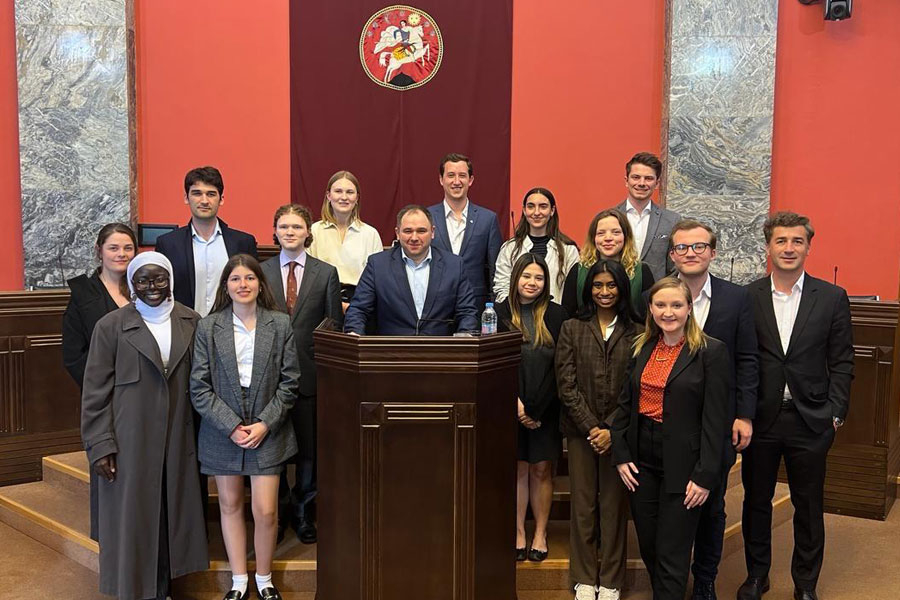Study Trip Offers Students a Rewarding Insight into Georgian Politics and EU Integration

Fifteen students traveled from Johns Hopkins SAIS Europe to visit Tbilisi, Georgia from March 28 to April 3, 2024—on a study trip during which they learned about Georgia’s domestic politics, foreign policy, and European Union accession process.
This student-led trip included participants from several degree programs, who got the opportunity to meet with multiple researchers, people at think tanks, foreign dignitaries, and government officials based in the Georgian capital. The topics discussed included the media landscape and media freedom in Georgia, democracy reforms, high-level corruption, national security, and the country’s EU and NATO accession processes. Students had the chance to speak directly with experts in these fields and high-level representatives working in Georgia.
Among the think tank and research organizations the students visited during the trip are the Eastern European Centre for Multiparty Democracy, the Georgian Institute of Public Affairs, the Georgian Institute of Politics, the Open Society Foundation, and Transparency International. These organizations provided opportunities for trip participants to learn about the difficulties of operating in a country experiencing polarized domestic politics, high-level corruption, partisan media, and a slow pace of democratic reforms.
The students also visited the American and European representatives in the country to speak about U.S.-Georgia relations and the EU accession process. Trip participants met the U.S. Deputy Chief of Mission Alan Purcell to discuss Georgia's strategic positioning in the Black Sea region and the U.S. Department of State’s work in strengthening the country’s democracy and deterring Russian aggression. At the office of the EU Special Representative for the South Caucasus and the Crisis in Georgia, the study trip participants learned about the regional conflicts with Russia in the South Ossetia and Abkhazia regions.
The students also met with the Delegation of the European Union to Georgia to discuss the progress the country has made on its accession process. Georgia applied for EU membership in March 2022 and was granted candidate status in December 2023, on the understanding that the country takes relevant steps as set out in an EU Commission recommendation.
The last day of the trip focused on meetings with representatives of the Georgian government to hear their perspectives on the country’s politics. Students first met with the members of the administration of President Salome Zourabichvili to discuss the role of the president as well as the administration’s work to advance Georgian democracy and the EU application process. The trip concluded with a visit to the chairman of the Foreign Relations Committee in the Georgian Parliament to learn about the policy priorities of the Georgian Dream party.
Students also took advantage of the opportunity to explore Georgian culture, food, and wine during the trip. The itinerary included a visit to the wine region of Kakheti, where the group toured a winery and tasted local wine. A favorite activity for many was a cooking class where students learned how to make the traditional Georgian treats, khinkali and churchkhela, during dinner in Mtskheta, one of the oldest cities in the world.
“Georgia has an interesting story to tell with its adventurous history, democracy struggle, European aspirations and cultural heritage,” said trip leader and Georgian native Irakli Kobalia, a Doctor of International Affairs candidate. “I am delighted that a group of SAIS students had a chance to explore the country through meetings with institutions, civil society organizations, embassies, as well as countryside travel. This was a truly rewarding experience.”
Enjoyed reading Study Trip Offers Students a Rewarding Insight into Georgian Politics and EU Integration? Learn more about what SAIS Europe has to offer.